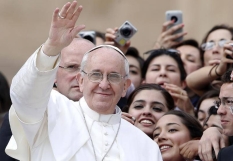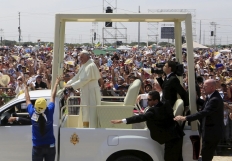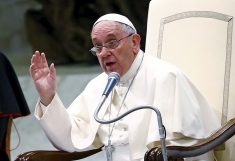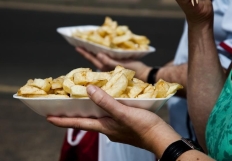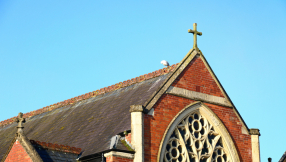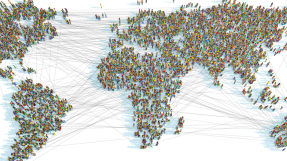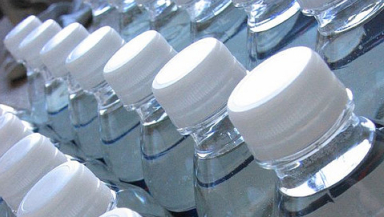
Bottled water: we're drowning in it. We casually buy it when we pick up a lunchtime sandwich. We take bottles on picnics, on walks, to the beach, when we're shopping or sightseeing. They're in vending machines, on supermarket shelves, in corner shops.
They aren't particularly cheap, either. And in Europe and North America, almost every purchase is completely pointless.
Here's what I think. The bottled water industry has a fair claim to represent the ultimate triumph of marketing over common sense. Advertisers have convinced millions of people to shell out for something that they can get for nothing by turning on a tap.
That's just my opinion. But it's worse than that: bottled water is responsible for waste and pollution on a huge scale. It takes three times as much water to produce a bottle than it does to fill it. While most plastic bottles are recyclable, only one in five is actually recycled. Of the ones that are, many are shipped off to India and China for recycling in hazardous conditions. Of the ones that are sent to landfills, many end up in rivers because of poor waste management and find their way out to sea: between 60 and 95 per cent of all marine debris is made of plastic.
There's more. But among an increasingly vocal chorus of opposition to bottled water has come a recent intervention by a World Council of Churches initiative, the Ecumenical Water Network (ECN). At a meeting in Geneva last month it issued an appeal to churches in Europe and North America to eliminate the use of bottled water from their premises.
The EWN's brief is wider than just bottled water – there are many areas of the world where access to enough clean water of any kind is problematic. However, in a fierce statement, it said that it "strongly believes that among many impediments of realisation of human right to water is the 'bottled water' industries. They have invaded practically every nook and corner of the world. Through their aggressive marketing strategies, they have been successfully captured the minds of people, particularly in the 'developed' countries, to think that 'bottled water' is safer and healthier than tap water."
The EWN's list of bottled water negatives is a long one. It says that the industry is involved in land and water grabbing which excludes the poor from access to safe drinking water. It accuses governments of failing to fulfil their responsibilities to provide safe mains water because they argue that people can buy it in bottles. It criticises the wastefulness of the production process, which uses a litre of water for every litre that's put in the bottle. The impact of production and distribution is huge: if measured in terms of the oil equivalent, says the EWN, it takes a quarter of a litre of oil to produce and distribute a litre bottle of water.
Hence its call to churches to ban the bottle, not because it would dent the enormous profits of the industry, but because it would be "a sign of our prophetic stand and solidarity with more than 1.8 billion people around the world who lack clean and safe drinking water and must instead drink contaminated water".
Social justice
And this raises a broader question. Bottled water isn't just about wasting money and resources. It is a symptom of much deeper issues of social justice.
Water, the lack of it and its fair distribution, is one of the key problems facing us in the 21st century. Someone who's devoted a good deal of his career to this is Dr Peter Gleick, President of the Pacific Institute and the author of Bought and Sold: The story of our obsession with bottled water. Gleick's book looks at how fearmongering by business interests, our own vanity, the breakdown of public systems and global inequities have created an industry which questions fundamental values.
In a chapter entitled "The War on Tap Water" he instances the opening of the new football stadium for the University of Central Florida. More than 45,000 people packed the ground in 100-degree heat, and found the hard way that the building had been designed with no drinking fountains. The only water available was in $3 bottles or through washroom taps. Eighteen people were taken to local hospitals and 60 more were treated for heat-related problems. After a public outcry, water fountains were installed.
It's an example of how water is commodified for profit. And, Gleick writes: "How do you convince consumers to buy something that is essentially the same as a far cheaper and more easily accessible alternative? You promote perceived advantages of your product, and you emphasize the flaws in your competitor's product. For water bottlers this means selling safety, style, and convenience, and playing on consumer's fears. Fear is an effective tool. Especially fear of sickness and of invisible contamination. If we can be made to fear our tap water, the market for bottled water skyrockets."
Gleick told Christian Today that while he wouldn't necessarily have written the EWN's appeal in the same way, it was on the right lines.
"I have never called for a ban on bottled water but I do understand and support efforts to eliminate its use where it's unnecessary," he said. "In North America and in Europe it's not necessary. We have high quality, low cost tap water."
He also raised the issue of 'environmental justice', echoing the EWN's criticism of governments which abdicated their responsibility to provide clean water for their people.
"If there were no such thing as bottled water, you can imagine that elites would be much more inclined to solve the problems of unsafe water," Gleick says. "There are some who say that we can just drink bottled water and that we don't need to spend billions on a safe water system. What happens is that the wealthy drink bottled water and the poor drink contaminated water and get ill. There are 700-800 million people with no safe drinking water and they get cholera and other water-borne diseases."
Aside from this, though, Gleick says there are questions about the sale of bottled water in principle. "You are turning a public resource into a private good," he says. "Someone takes water from a river or groundwater and turns it into a saleable item. That is ethically problematic."
Private or public?
He stresses that this is not an argument against privatising the supply of water. A Pacific Institute study found that a safe, effective water system could be public or private – he instances the UK water privatisation under Margaret Thatcher, which he says has "worked out reasonably well". "In the US, water is primarily a public utility and is mostly well-run. It can be public or private, but you have to have government oversight."
So what's the answer?
Obviously, not to ban bottled water. A few years ago my home town was hit by floods that knocked out the local water treatment works. Residents survived on bottled water provided by the local authorities and were glad of it. There are parts of the world where, at the moment, there is no alternative – though bottled water never needs to be a long-term solution.
What the EWN statement does is remind the Church – and its members who buy bottled water, consume it and take it for granted – that there is an alternative, and if there isn't, there should be. As Gleick says: "Whether or not the churches cut their use of bottled water, this is an opportunity to educate the public about water issues and raise questions about everyday behaviour.
"I live in a place where the tap water is very good, but I still see people with bottled water. They aren't bad people, but they don't think through the bigger issues."
It may seem like an unlikely cause. But the bottle of water we so casually pick up stands for some big issues: social justice, care for creation, the balance of power between human rights and big business, and the need for counter-cultural living.
Follow @RevMarkWoods on Twitter.










